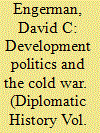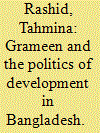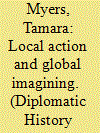| Srl | Item |
| 1 |
ID:
152907


|
|
|
|
|
| Summary/Abstract |
Development Politics and the Cold War’ analyzes history of development assistance during the Cold War, focusing especially on superpower aid to India for the three decades after independence in 1947. It examines development as a rhetorical strategy that allowed groups in both donor and recipient nations to make claims upon others. It also calls for moving beyond “development talk” to examine the practice of development. And finally it shows how development assistance – undertaken in the name of building economic self-sufficiency, ultimately undercut the governability of recipient nations.
|
|
|
|
|
|
|
|
|
|
|
|
|
|
|
|
| 2 |
ID:
115249


|
|
|
|
|
| Publication |
2012.
|
| Summary/Abstract |
Bangladesh is one of the countries with a thriving political culture, vibrant civil society and a huge development sector, yet struggling with the issues of persisting poverty as a substantial majority still lives below the poverty line. The development sector has largely maintained an apolitical posture focusing on expanding their outreach, commercial enterprises and access to donor assistance. As a consequence of new economic realities and dynamics of financial markets at local and global level, the sector is increasingly being pushed to expand its influence in the local power structures, thus shifting the nature of their relationship-from a non-engaged to an actively engaged relationship with the state. This article would argue that the increasing commercial/entrepreneurial activities are reshaping the development sector in Bangladesh, even overhauling the dynamics of the socio-economic and political scene. As these not-for-profit organisations are entering into a state-regulated sector, in which other actors (business houses) are already operating, lobbying to protect similar commercial interests, there are contestations around regulatory regimes and political agency in policy-making arenas. Recent controversy around Yunus's role in the Grameen Bank is indicative of the shifting nature of developmental politics.
|
|
|
|
|
|
|
|
|
|
|
|
|
|
|
|
| 3 |
ID:
132018


|
|
|
|
|
| Publication |
2014.
|
| Summary/Abstract |
In the late sixties Canadian young people drew attention to global humanitarian crises through the relatively recent innovation of the hunger march. At its peak of popularity, the Miles for Millions walkathon functioned not only as a fundraising tool but as a consciousness-raising vehicle around issues of global significance, including famine, poverty, and war. Children and youth played both symbolic and material roles in the emergence of international development politics and praxis and were fundamental to making the walkathons a spectacular fundraising success. The Walk helped hundreds of thousands of young people imagine themselves belonging to a transnational community in which children mattered. At the same time, imagining global connections between children and youth became intrinsic to Canadian students' sense of nation that insisted on the importance of the country's response to international need. Empathic, emphatic, idealistic, and at times naïve, Canadian youth met the challenge of the Miles for Millions walkathon and were responsible for the millions of foundational dollars raised for the era's international development projects.
|
|
|
|
|
|
|
|
|
|
|
|
|
|
|
|